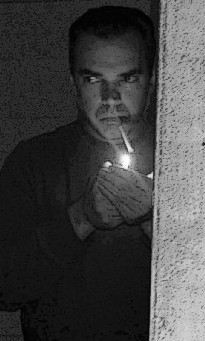On Artistry
 In college, I was once asked by one of my drama teachers how I would define 'theater.' I replied, 'A sanctuary for people who can't do anything else.' Although my teacher did not appear to be pleased with my answer, I have found this spontaneous theory to be pretty accurate. Sure, actors, writers, tech folks and directors can do other things – if one is involved in theater, one must learn to do other things, unless one has a starvation fetish – but the real theater people breathe, eat and sleep the stuff.
In college, I was once asked by one of my drama teachers how I would define 'theater.' I replied, 'A sanctuary for people who can't do anything else.' Although my teacher did not appear to be pleased with my answer, I have found this spontaneous theory to be pretty accurate. Sure, actors, writers, tech folks and directors can do other things – if one is involved in theater, one must learn to do other things, unless one has a starvation fetish – but the real theater people breathe, eat and sleep the stuff.
And these people, I would say, have some damage to start with.
But who doesn't?
The best folks in the performing world blend being an artist and being art itself. The best way I can describe this is when you watch a performer and completely forget that they are performing. I've been lucky enough to see this a number of times over the last few years – notably, Angela Jo Strohm in the 2009 movie "Gless" by Herbivore Productions; Caitlin Emmons in my 2008 play, "The Tearful Assassin". I know I am nowhere near being that kind of artist, which is why I tend to gravitate towards writing over acting.
A performing artist, in my view, is like a jazz standard: recognizable but always morphing, guided by instinct and circumstance, always seeking that connection with the other players. When I see that happen, I get what my wife calls the "L.O.L." – not "laugh out loud" but "look of love." People on top of their game… I love them.
If the best folks in the performing world blend being an artist and being art itself, the worst do neither. Like most professions, theater is choked with people who use their "craft" to propagate whatever damage they're not facing. These folks are "Problem Children", and I've yet to work on a show in which there hasn't been at least one (this includes 2008's "The Woman in Black", in which I surprised myself by being the Problem Child – I reversed course immediately after that). My wife has suggested that I create an anonymous website listing and describing Problem Children but, though it would probably prove beneficial to producers, who must cast characters without knowing actors' characters, such "power" could easily fall into the wrong hands.
One such Problem Child said to me, "I do theater because it makes me feel good": that, make no mistake, brothers and sisters, is a direct threat. You know nothing good is going to come after such a self-centered declaration. Moments later, she made good on the threat by blaming her co-stars and the production team for why she was disengaged from the production. After making the point that she was supportive of her cast mates (I heard the "but" in that line before she continued), she promptly quit the production.
The benefit of working with Problem Children is, of course, that once you identify someone as one, they don't bother you. If you can handle an 8-year-old brat, you can handle a Problem Child. And, as much as one wants to yell right back at them, it is best not to. In the best-case scenario, they might learn something – and who wants an intelligent Problem Child out there?



